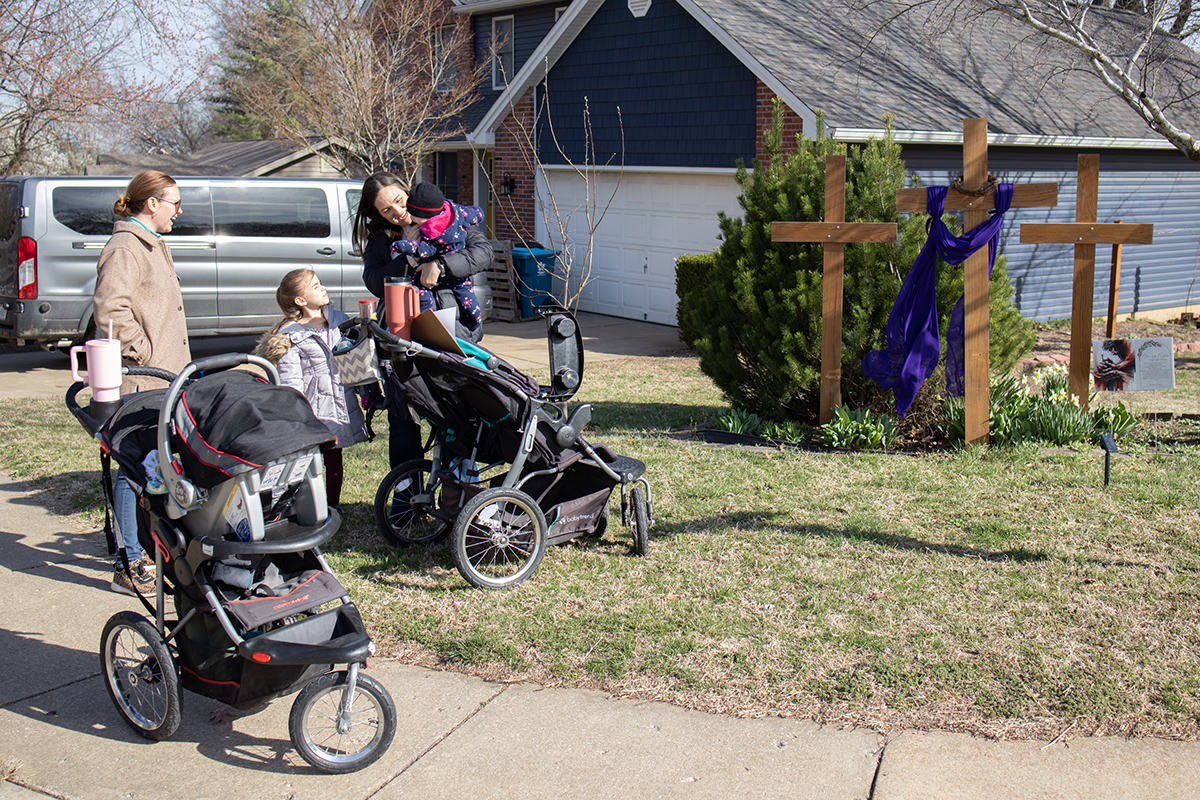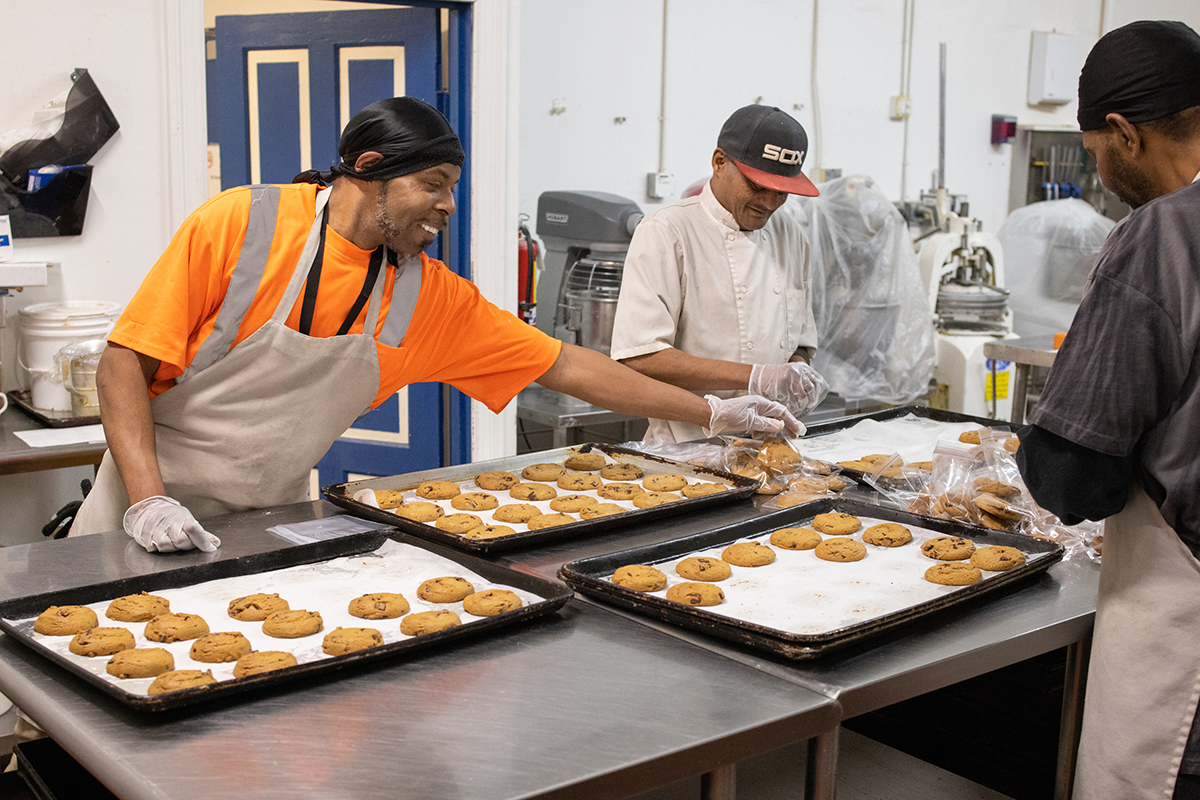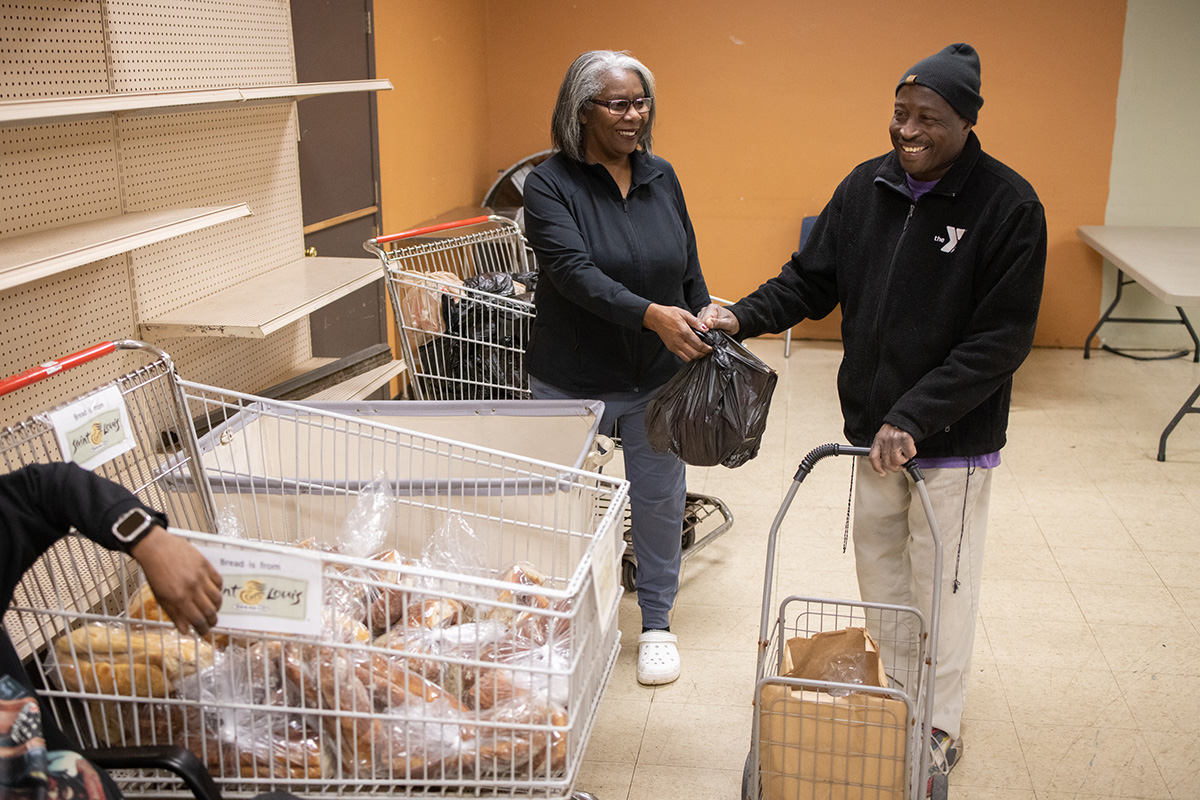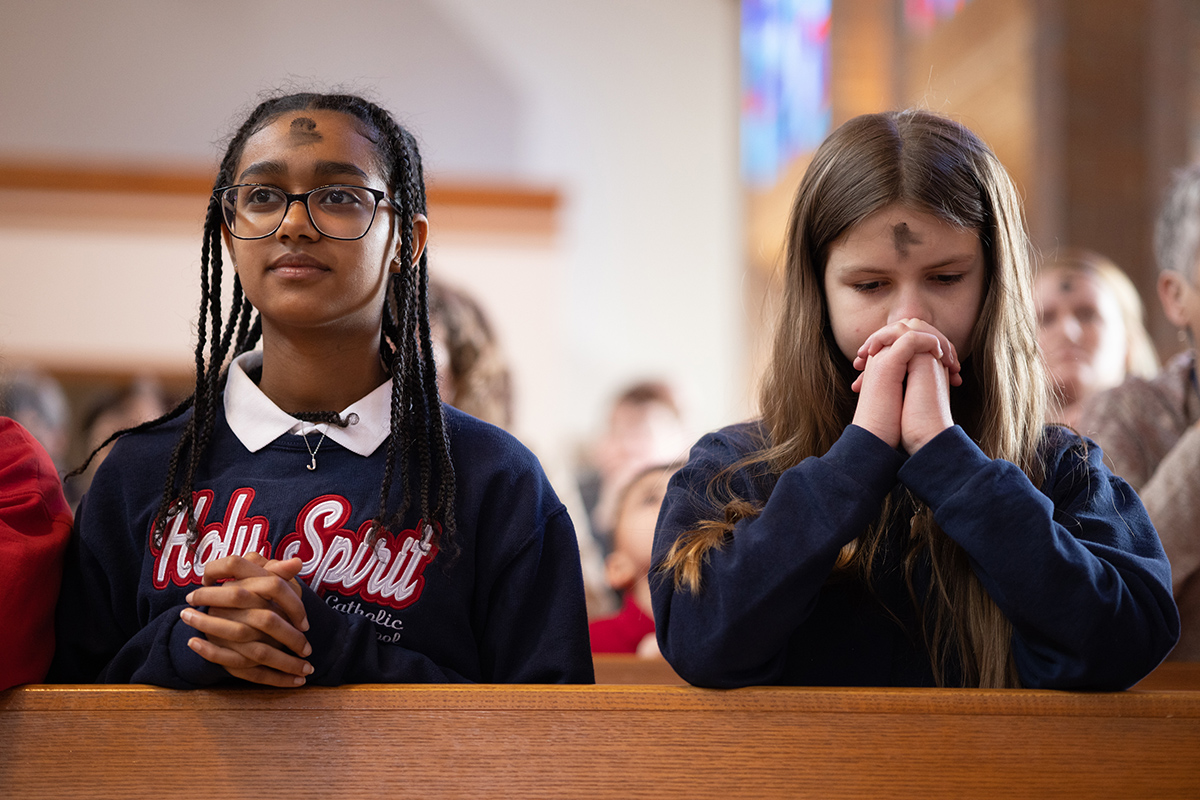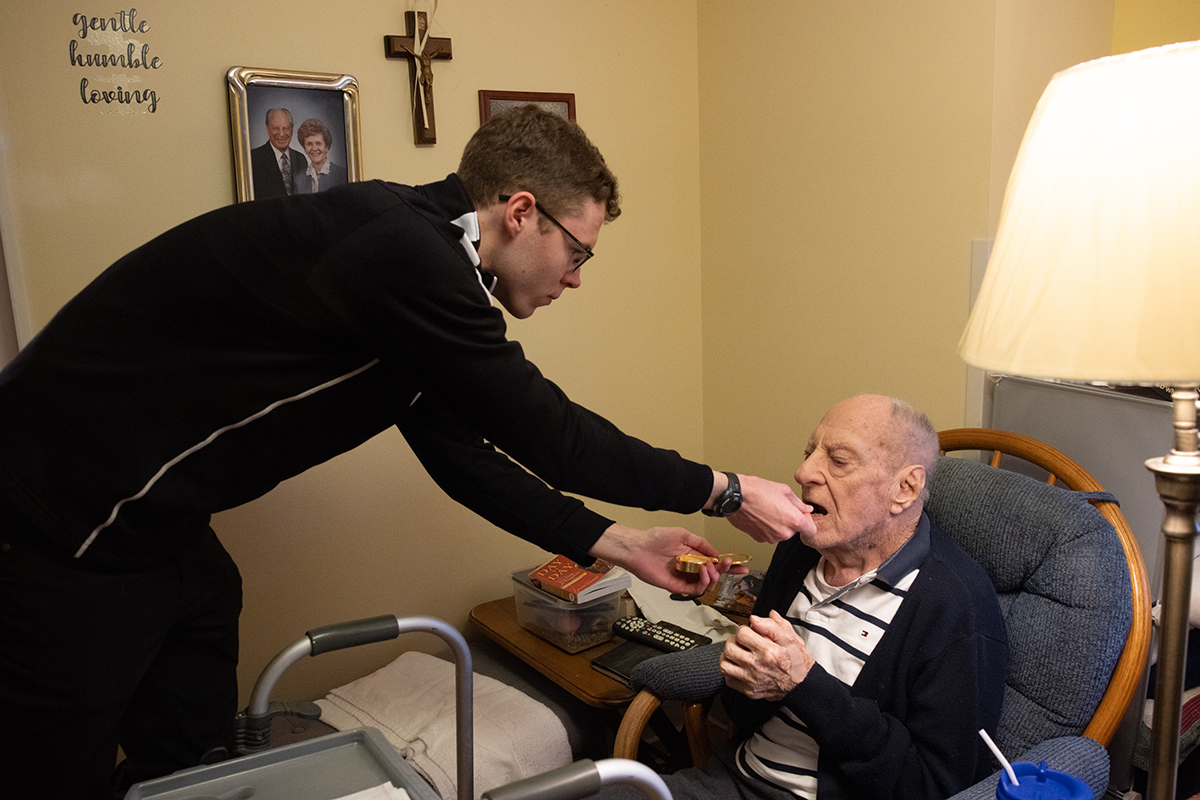Local farms show care for humanity and the land

Urban and environmentally responsible farmers provide food for area residents
Where four homes once stood in the St. Louis Place neighborhood of north St. Louis there’s now two greenhouses, a chicken coop, rows of vegetable plants, even bee hives. Planting, harvesting, processing and selling are some of the activities there.
Mary Densmore and her husband, James Meinert, are urban farmers using sustainable, pesticide-free practices on the property next to the former St. Liborius Church.
Densmore grew up in suburban Atlanta with no connection to farming but always loved the outdoors. She met Meinert serving with the Jesuit Volunteer Corps in a dense, poverty-stricken area of Managua, Nicaragua from 2006-08. “Everyone there has a mango tree in the backyard, a bunch of herbs in pots, it’s the way they lived their lives,” she said.
Farming “is healing to me,” Densmore said. “I’m involved in the whole process of it. It’s both extremely satisfying and really hard work.”
In caring for the environment, “we’re also deeply caring for ourselves, humanity in the long haul,” she said.
Local food system
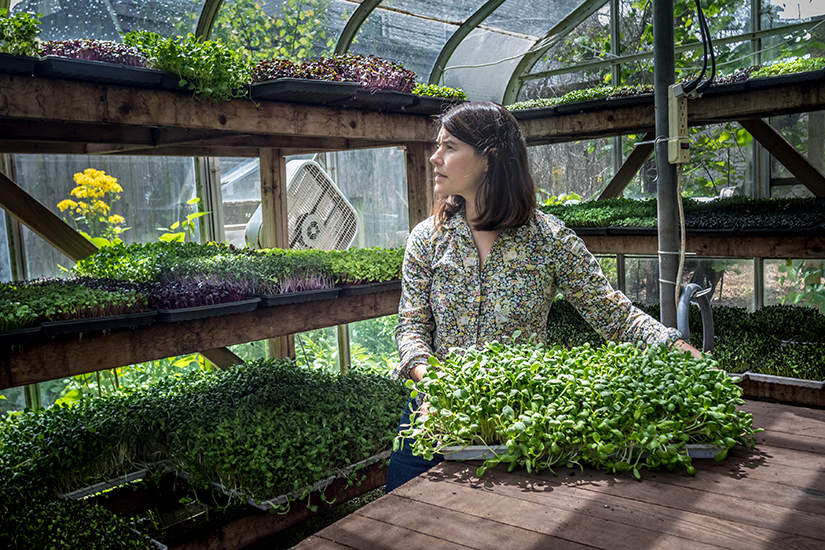
When they moved to St. Louis from Central America, the couple became involved with Karen House, a Catholic Worker shelter in St. Louis. Meinert, who grew up on a farm in New Haven, lived at Karen House and she lived at Kavat House, a shelter for immigrants and refugees. In 2009 they started volunteering nearby at New Roots Urban Farm, a farming collective that provides organic produce to the community.
They took over as one of the overseers of New Roots, and Densmore began Bee Simple City Farm on the property next to the former St. Liborius Church in 2014, with Meinert joining her after having worked as a teacher. While New Roots is a social project for people who don’t have access to fresh produce and fruit, Bee Simple is a commercial operation with niche products.
Echoing Pope Francis’ encyclical, “Laudato Si’ (On Care for the Earth),” the most financially stressed people will be the first to be stressed by climate change, Densmore said, citing “the need to care for the least of these.”
Treating the earth as a resource that can constantly be taken from for profits is not realistic long term, she said. The incorporation of sustainable agriculture practices and land management techniques and strategies brings her hope.
The urban farming they’re doing had been seen as a fringe activity, but with the pandemic, more people are inquiring with her on how it’s done. “This is a moment when people realize we actually need a local food system, and we have one,” Densmore said. “It’s just not as strong as it could be.”
Meinert said he was moved by Pope Francis’ encyclical issued in 2015, and it’s part of the reason they picked Francis for their daughter’s middle name. “It was was a radical encyclical, getting to the roots of what it means to be Catholic and caring not just for each other and the least of these but for our planet and being stewards for our environment,” he said.
He felt joy and hope in reading it, but it’s matched by disappointment that more Catholics haven’t made the pope’s call for action and policy changes as central as other issues.
Bee Simple City Farm
WHAT: The farm specializes in products such as microgreens, herbs, edible flowers, honey, lotions, balms and soaps.
WHERE: Just a mile from Downtown, sharing the grounds with New Roots Urban Farm, at 1832 Hogan St., St. Louis, MO 63106
FOR INFORMATION: Visit www.beesimplecityfarm.com, or contact them at (404) 403-8382 or beesimpleproducts@gmail.com
Melissa Vatterott, food and farm director at the Missouri Coalition for the Environment, said in the last five years small-scale environmentally responsible farmers in the St. Louis region have received more attention as consumers recognize the value of purchasing and consuming products that are grown near them. It reduces transportation costs “but more importantly gives them an understanding of what is going on on the ground at those farms near them. There’s more transparency with products grown near us and a relationship with the farmers that consumers are seeking to have,” Vatterott said.
The Missouri Coalition for the Environment’s Known and Grown STL is a marketing program for farms such as Bee Simple within 100 miles of St. Louis that are committed to responsible practices. Forty farms are in the year-old program.
As a Catholic, she is aware of Pope Francis’ encyclical and support of environmentally responsible farming. “I am thrilled and feel it is an incredibly hopeful message,” Vatterott said.
It’s a way to help people feel environment stewardship is a spiritual practice, she said, and “a way to reconnect with this beautiful earth God has given us and with one another through supporting the farmers who grow our food. This food is grown with concern for our soil, our water and other beings on earth.”
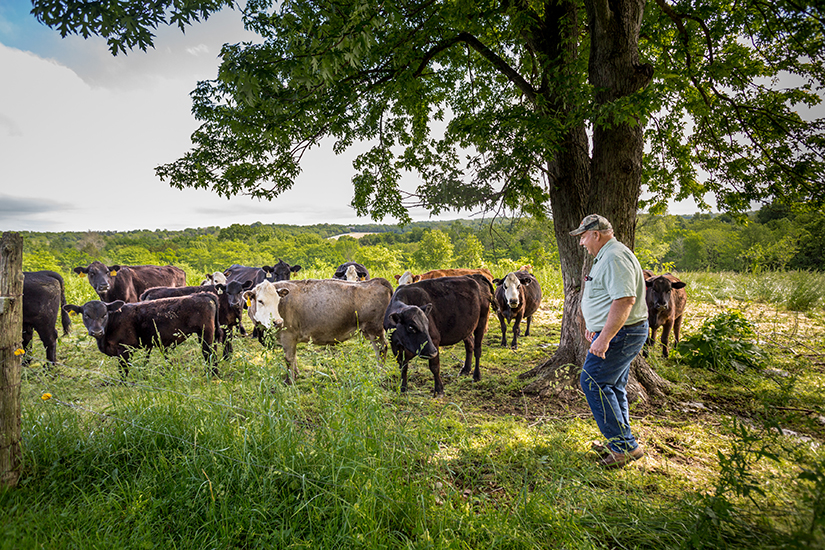
Family farms
Joe Tobben, a parishioner at St. John the Baptist (Gildehaus) in Villa Ridge who operates a fifth-generation farm that sells some meat pre-arranged to local families, said “we don’t pump our cattle up with chemicals and whatever they use all the time. We do spray our crops to keep weed control, but the environment is very important to us because we keep the farm going for generations and generations.”
The parish has a history of support for family farms, Tobben said, citing the work of Msgr. George Hildner, a former pastor known as the “Savior of Souls and Sod” and “Alfalfa George,” who was an ardent soil conservationist and a founder of the National Catholic Rural Life Conference (now known as Catholic Rural Life).
Another farmer from the parish who also sells some meat pre-arranged to local people, Eric Haberberger, said some farms in the area sold to big corporations. But he sees a rise in interest in buying locally produced food. “They want to know where and how it’s taken care of,” he said.
Three Spring Farms raises grass-fed beef in Perryville providing responsibly raised meats and vegetables to neighbors and customers in the St. Louis region. They are part of Known and Grown STL and farm sustainably.
Andrew Bachmann farms and Bryan Meyers, a physician, connects with customers. They transformed a farm that raised corn and soybeans along with pigs in confinement to one with pasture for the beef to graze in. Using management intensive grazing, “you don’t have to till it, go over it with tractor to harvest, spray herbicides or pesticides,” Meyers said. “That ends up being very beneficial to the farm and the animals. They’re always getting fresh grass, always leaving behind waste products.”
They also have hogs that have full access to fields as well and chickens that have fresh fields as well.
Farmers markets
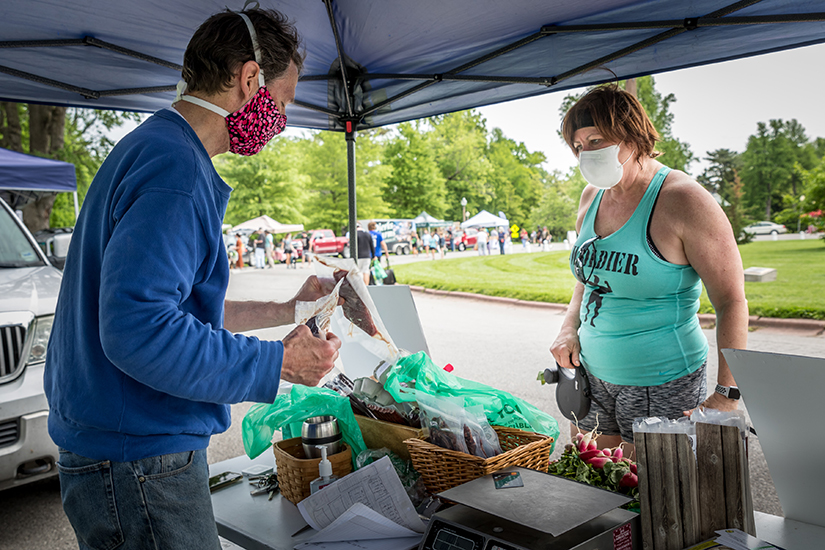
The Tower Grove Farmers’ Market is one of several similar markets in the St. Louis area.
On May 16, shoppers found a lot to like, including the Three Spring Farms booth. Mary Foshage, a parishioner at Epiphany in St. Louis, purchased radishes to go with other items she’d purchased from other vendors, including greens, zucchini and tomatoes.
Produce from local, family farms is better for the environment and healthier, Foshage said in explaining her purchases. Clean air and water is important to her. “Being stewards of the land is important, and we should be stewards as buyers,” she said.
Right now, with the coronavirus pandemic, fewer people are going to farmers’ markets, she said, but she saw an increasing number in the past few years.
Tim Zackery, an Incarnate Word in Chesterfield parishioner, stopped by with his two boys. Purchasing from local farmers, which are smaller operations, is healthier he said, so “you take care of yourself, family and community. Sustainability is important, too. They have the opportunity to pay attention to the land, it’s not industrialized.”
Amy Shaw of Holy Infant Parish in Ballwin said she enjoys the products from farmers’ markets. “It tastes better,” Shaw said.
For information on Tower Grove Farmers’ Market, visit www.tgfarmersmarket.com.
Resources
The Missouri Food Finder (www.MOFoodFinder.org) connects Missouri consumers with people growing and selling locally produced food in their region.
Developed by University of Missouri Extension’s Center for Applied Research and Engagement Systems (CARES) in collaboration with the Missouri Department of Agriculture, the Missouri Food Finder helps address an immediate need, said Jo Britt-Rankin, associate dean with MU Extension Human Environmental Sciences.
The economic impact of COVID-19 is expected to hit local producers and growers hard, threatening businesses and livelihoods as they are cut off from their usual markets and selling opportunities, said Marshall Stewart, MU vice chancellor for extension and engagement. Consumers face the loss of many usual food options and have heightened concerns about how and where they will be able to buy food.
“This easy-to-use resource connects Missouri growers and families in powerful ways that will help farmers and small businesses continue to thrive, while also helping families find nutritious local and regional food options,” Stewart said.
Farmers, growers and local suppliers can enter basic information about the food they sell, their hours, location and contact information. Consumers simply type in their location to see what options are available in the area they select.
Another guide to local food is from Known and Grown STL (www.knownandgrownstl.org). It helps farmers withing the St. Louis area spread the word about their practices, their products and the principles that guide them. It is a project of the Missouri Coalition for the Environment on behalf of the St. Louis Food Policy Coalition.
St. Isidore the Farmer
Feast Day: May 15
It is said that two angels appeared and joined St. Isidore in his daily work plowing the fields. More than 400 miracles are attributed to his intercession. In February 1947, St. Isidore was constituted as the special protector of American farmers and of Catholic rural life.
Where four homes once stood in the St. Louis Place neighborhood of north St. Louis there’s now two greenhouses, a chicken coop, rows of vegetable plants, even bee hives. Planting, … Local farms show care for humanity and the land
Subscribe to Read All St. Louis Review Stories
All readers receive 5 stories to read free per month. After that, readers will need to be logged in.
If you are currently receive the St. Louis Review at your home or office, please send your name and address (and subscriber id if you know it) to subscriptions@stlouisreview.com to get your login information.
If you are not currently a subscriber to the St. Louis Review, please contact subscriptions@stlouisreview.com for information on how to subscribe.


